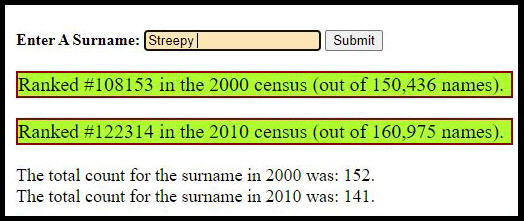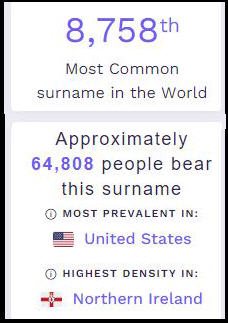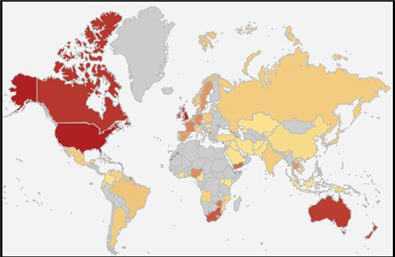This article shows you how to use our simple online tool to check how rare your last name is in the United States.
We’ve also got instructions on how to check the popularity of your name across the world.
Why do some last names become increasingly uncommon? We’ll explain how this happens, and give you examples of rare and extinct surnames.
How To Check If You Have A Rare Last Name In The U.S.
A rare last name means that very few people in the country share that name.
You may think that your last name is very unusual. But there could be thousands of people in cities on the opposite coast with your surname.
How can you find out? The easiest way is to use our online tool that checks how last names rank in the 2000 and 2010 U.S. census.
How we define rare last names
How few people does there have to be for a last name to be rare?
That’s a subjective decision. Our tool gives you your rank along with how many surnames were in the census.
So, if you see that your rank is #110,000 out of 150 thousand names? For me, that is a rare surname.
Instructions on checking the popularity of your last name
Step 1: Click this link to open the surname ranking tool.
Step 2: Enter your last name into the input box (or any name you’re interested in).
Step 3: Review the information provided with these tips:
- Your rankings are given with the context of the total number of surnames in the census. That helps understand whether its rare or common.
- Has your ranking gone up or down from 2000 to 2010? Is it becoming more rare?
- You’ll see the total counts for the number of people in each census.

This was ranked #108,153 in the 2000 census. Is that high or low?
Well, the tool tells you that this census had a total of 150,436 surnames. So, I consider this to be rare.
Ten years later, the ranking had dropped to #122,314. So, it’s getting rarer.
The tool also shows you the total number of people who bear that name that year. This may be a bit easier to digest. 141 people would hardly fill a village hall!
What does it mean when the tool can’t find results?
If you want an example, enter the last name “Streep” (yes, the name of the great actress).
The tool will tell you that there are no results for this name. Was Meryl Streep visiting another country that day? Possibly.
But this doesn’t mean that the name hasn’t gone extinct. The U.S. Census Bureau only provides a ranking for last names that appear at least one hundred times in the census.
So, there could be 99 people with that name in the census.
And always remember that the tool looks for an exact match. There may be many small spelling variations with hundreds of bearers.
Where does the data come from?
The data behind the tool comes from public files provided by the Census Bureau.
The files are linked at the bottom of these information pages. They have all surnames that appear in the census at least one hundred times.
Using The U.S. Census Data Yourself
Would you prefer to work with the data yourself? Here’s how to go about it.
The Bureau provides a Microsoft Excel spreadsheet (the .xlsx extension). Alternatively, you can import the text file into another spreadsheet application e.g. Google Sheets.
The first column has the name, and the third column has the number of appearances in the census. Do a search for your last name to see how many other people shared this name.
The names are in upper case, so make sure you leave the “match case” option off.
How Rare Is My Surname Worldwide?
Checking globally is a much greater challenge to get accurate results.
Any file or database would have to have national data from every state. There are many countries that don’t run a regular census. Others may not have mandatory birth registration.
So, a perfect database doesn’t exist. However, a few organizations have had a go at collecting as much international data as they can find.
Using Forebears.io
Forebears.io is the website of a Serbian company that collects name data from across the world.
When you enter a surname into their free search feature, the website provides estimated data like:
- How common your name is
- Approximately how many people have this name
- Where it is most prevalent
Here’s an example from one of my grandparent’s names:

I focus on the second number to try to grasp how rare is the surname that I’m checking.
When you scroll down a little further, you get a neat visualization of how your name is distributed across the world.

The surname definitions on Forebears
Forebears.io also gives you a definition or meaning of the surname. You can take this with a pinch of salt.
Here’s an excerpt of what I got for the very common Irish name of “Collins”.
The -in Colling and Collings is excrescent (compare Jennings).
Forebears.io
I’ll be honest with you, I have no idea what that means. The rest of the description seemed very archaic.
When I looked into this a little more closely, I realized that Forebears scanned in a load of old books on surnames. The website is simply serving up excerpts from these old tomes.
The example above is from a book published in 1896. This is “A Dictionary Of English And Welsh Surnames” by Charles Wareing Endell Bardesly.
Does Bardesly represent current academic thinking? I don’t know.
How accurate is Forebears.io?
I’ve already mentioned that no database can be completely accurate.
The accuracy of Forebears depends on where they are sourcing the data. They seem to be pretty good for Western developed countries.
However, people have commented they may be less accurate for non-Western countries e.g. Vietnam.
Why Do Last Names Become Rare?
There are several reasons why surnames start to dwindle in number until some will disappear.
Spellings may change from generation to generation, especially when people migrate from one country to another.
War, famine, and natural disasters can remove not just families but an entire village from history.
Names as occupations
We know that many names refer to old professions, and some of those occupations have gone or changed in recent centuries.
For example, Culpepper is a surname on the brink of disappearing. This old English name referred to herbalists or spicers. The profession hasn’t died out, but perhaps they chose to use the name of Spicer instead.
Women changing their names
But the biggest factor is probably from women taking their husband’s last name in marriage.
If the married couple only has daughters, then the surnames of both spouses have slightly dwindled.
Names can get rarer very quickly
When the number of people with last name starts to dwindle, then the effect beings to accelerate.
A female from the Gastrell family is statistically more likely to meet and fall in love with a Smith than a Birdwhistle.
If she marries, then that’s one less Gastrell in the world. And their children represent more Smiths to outnumber the Birdwhistles!
Rare And Extinct Last Names In The United States
What about in the United States? Extinct names are surprisingly difficult to nail down.
The U.S. Census Bureau keeps a tally of surnames from the national census, but they don’t publish which names have completely disappeared. However, they do list the names that only have one hundred bearers in the 2010 census.
Here are some of the rarest names in the United States.
- Acott
- Addyman
- Angliss
- Ashes
- Baitz
- Bennit
- Bonce
- Brownsword
- Capenter
- Concord
- Copperman
And that’s just a selection from the As, Bs, and Cs!
I must admit that Concord and Copperman surprise me.
And I wonder if recent generations of the Baitz and the Bennit families were simply tired of having their names misspelled all the time.
The Bates and the Bennetts have a much easier time picking up their prescriptions!
Rare And Extinct Last Names In Britain
I was surprised to learn that Bread, Chips, and Relish are extinct names in Britain.
Suddenly British readers are thinking about having a chip sarnie for tea.
Here are some more examples of names with under two hundred bears, under twenty bearers, and completely extinct in Britain.
| Under 200 | Ajax | Edevane | Gastrell | Slora |
| Under 20 | Birdwhistle | Miracle | Sallow | Tumbler |
| Extinct | Bread | Bythesea | MacCaa | Spinster |
How To Check All Names In Your Family Tree
You may have a family tree with hundreds (or thousands) of last names.
Would you like an easy way to prepare a list that is easily formatted for checking on the Forebears.io website?
Check out our tutorial on extracting a list of surnames from your family tree.
What About Common Names?
We’ve focused on looking at rare names in this article. But what if you want to know the opposite?
Check out our separate article on how common your last name is.
Starting A Family Tree?
You have several choices if you want to build a family tree online. I use Ancestry.com, but I also keep a family tree on MyHeritage.com too. Both sites have their advantages.
If you intend to use Ancestry, we have plenty of articles and tutorials. Here’s an overview of our tips and tutorials on building your family tree on Ancestry.com.
Iam a willmer i guess willmer sounds german cause i do have german irish french filipino ancestry…and deep down thats too deep..evn dutch ancestry..hoogwerf is my dutch ancestry surname